Opinion

This week has been one where loss seems as close as it might ever be — losses significantly more important than tennis matches. Thinking of politics as sports is deeply unhealthy but understanding and identifying when we are losing is important. Loss is never inevitable, but neither is victory.
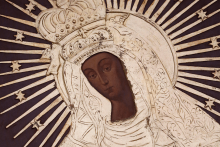
Teresa Kim Pecinovsky's Mother God and Christena Cleveland's God Is a Black Woman offer different portraits of a feminine God whose powerful love reshapes the world.

Since the pandemic upended life as we knew it over two years ago, I have found the apostle Paul’s letter to the church at Corinth particularly instructive. In 1 Corinthians 12, Paul provides one of the most poignant metaphors in all of scripture, comparing the health of the church to that of the human body — a comparison that also applies to the health of our broader communities, nation, and world.

But while my ethical objections led me to atheism, my trauma led me back to Christ. Simply put: I had a relapse and sought out a faith community because I needed to be around people. Praying helped. Being around people helped. Devoting myself to something bigger than myself and to Christ on the cross was an incredible comfort while I searched for effective medical treatment.

The show is based on Jon Krakauer’s 2003 book of the same title, detailing the brutal 1984 murder of a woman and her infant baby by two brothers from the Lafferty clan, a prominent family in the Church of Jesus Christ of Latter-day Saints.

During my time in college and graduate school, I accumulated something like $50,000 in debt. So, you’d imagine I would be particularly excited about the prospect of Biden forgiving some of my debt. But I already paid off my student loans! Does that mean I rue others getting theirs forgiven? No! I am happy that other people may receive debt forgiveness even if it doesn’t apply to me.

Through the years, we’ve written about the ways churches can help workers — and the way workers can help the church.

If God tends to the lilies of the field, how much more will God protect the poor and oppressed (Matthew 6:25-34)? This is the correct definition of divine providence: God cares for, loves, and empathizes with the meek who will one day inherit the earth. This is the providence that theologian James H. Cone imagined in his seminal work God of the Oppressed: “God has not ever, no not ever, left the oppressed alone in struggle. He was with them in Pharaoh’s Egypt, is with them in America, Africa, and Latin America, and will come in the end of time to consummate fully their human freedom.”

The Bad Guys asks viewers to check their biases and assumptions about who is “good” and who is “bad.”

Twitter is a strange thing — if it’s any singular thing at all. If it does come to an end, I hope we’ll look back reflectively and carefully, learning from what we got right, what we got wrong, and growing into the future.
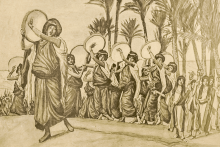
The women, in their songs, engage their community with authority, devotion, resolve, and assurance, offering praise for God’s work among and with them.

While Rethinking Sex maintains a nearly secular perspective throughout, toward the end of the book she draws on 13th-century theologian Thomas Aquinas’ definition of love, which is that we should be “willing the good of the other” and creating goodwill in our relationships and interactions with other people.

There are two common responses to climate fear in light of our planet’s alarming trajectory. One is escapism, which manifests as a selfish naivety that embraces a future hope of heavenly bliss and ignores the destruction around us. The other is despair, or an inability to see beyond our current disaster. I’d like to suggest a third response: an active, paradisiacal hope that doesn’t disconnect from the present world, but instead meets our planetary problems head-on.

I wish I could say that my journey into beekeeping began in some profound manner, especially as a person who has spent years working on policies that impact the environment and food security. But the truth is that I started playing The Sims 4 to keep myself entertained during the pandemic, and the game had a beekeeping feature. As I played, I thought, “I can do this.” And that is how my beekeeping journey began.

Recently, Florida House Bill 1557, more commonly known as the “Don’t Say Gay Bill,” was signed into law by Republican Gov. Ron DeSantis. Speaking from a podium adorned with the slogan “Protect Children, Support Parents” DeSantis, a Catholic, wasted no time vilifying the bill’s critics as sexual indoctrinators. He was hardly the first to do so. During the initial backlash to the legislation, Christina Pushaw, DeSantis’ press secretary tweeted from her personal Twitter account that opponents of H.B. 1557 were probably sexual groomers: “If you’re against the Anti-Grooming bill, you are probably a groomer or at least you don’t denounce the grooming of 4-8 year-old children.”

So when I read about people like Katie, one of many affirming parents who are leaving Texas because of the threat of having their transgender child taken from them, I think of the way the women at the tomb fled in fear. And when I hear Maddie, a trans girl in North Carolina, say, “If I didn’t have my hormones or my [puberty] blocker, I’d be very unhappy, and I wouldn’t want to leave the house sometimes,” I think of the disciples with the door locked on Easter evening.

On the IRS Form 1040, there is a section titled “Third Party Designee” which asks, “Do you want to allow another person to discuss this return with the IRS?” When filling out my 1040 for 2021, I simply wrote, “Jesus paid it all, all to him I owe.” This is what people mean when they say, “let go and let God,” right?
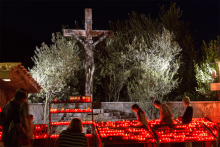
Many of the white evangelical churches I have visited and grew up in framed Good Friday as a celebration. I have attended services that centered around dramatic skits or clips of Mel Gibson’s The Passion of the Christ in order to evoke an emotional response. Another service treated Good Friday like a visitation where congregants were encouraged to reflect on their “friend Jesus” and share words of gratitude.
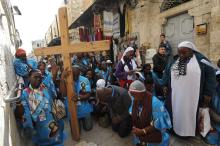
So as we move through Holy Week, I want to offer a prayer that pauses at each step along Jesus’ journey, from his agony in the garden to the triumphant joy of Easter. As we anticipate Christ’s ultimate victory over sin, death, and injustice on our behalf, let us find the courage to linger in the uncertainty, the suffering, and sacrifice that builds up to the glory of the resurrection.
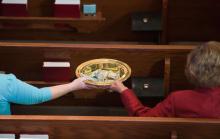
I admit that if you catch me on a bad day, I might join the chorus demanding that the government take aggressive action. As a former Catholic, I often contemplate how the law may have helped the Catholic Church hide its crimes against children. But in an effort to find some common ground, my position simply is that religious institutions should have to earn the exemptions in the same way that secular nonprofits do. This means that they would have to show how much money they bring in and how they spend it.